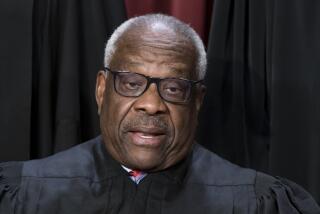Defining Sex Harassment Splits Justices
- Share via
WASHINGTON — Justices Antonin Scalia and Ruth Bader Ginsburg clashed Wednesday during a spirited exchange at the Supreme Court over how to define sexual harassment in the workplace.
At issue was whether a woman’s job performance must suffer in some way before she can claim that she is a victim of illegal job discrimination.
When government attorney Jeffrey P. Minear suggested that a woman may have suffered discrimination simply because of sexist behavior by an employer, Scalia snapped: “You mean it’s unpleasant to work there. . . . That’s what you mean. Why don’t you say that?”
An assistant to the U.S. solicitor general, Minear was arguing that a woman’s job performance need not be affected by the harassment.
“You’re still talking about an unpleasant environment,” replied Scalia, clearly unconvinced that such conditions alone constitute true discrimination.
At this point, Ginsburg jumped in to agree with Minear. In her view, sexual jokes and uncouth behavior alone could amount to illegal workplace discrimination against women.
“One sex has to put up with something the other sex doesn’t have to put up with,” she said. “It is different treatment for men and women.”
During much of the hour, the court’s two most assertive justices batted the issue back and forth, pressing the competing attorneys to bend to their view of the law.
Though Scalia, 57, and Ginsburg, 60, are said to be close friends who respect each other’s legal ability, they have wasted little time in staking out contrasting positions.
The exchanges came as the justices heard arguments in a discrimination case (Teresa Harris vs. Forklift Systems, 92-1168) that seeks to clarify the law on sexual harassment on the job.
Though Harris was called a “dumb-ass woman” by her boss and made the victim of embarrassing jokes, the U.S. Appeals Court in Cincinnati said her job rights were not violated because she did not suffer “psychological damage.”
But other federal courts have taken the view that a woman’s rights are violated simply when she is subjected to offensive language.
By the end of the hour, it seemed clear that the justices would throw out the requirement that a woman must suffer demonstrable psychological harm before she can win damages from her employer.
They seemed closely divided, however, over whether an employer’s use of offensive language would be enough to justify a damage verdict in favor of a woman worker.
Stanley Chernau, a Nashville attorney representing Harris’ employer, said the federal job-discrimination statute is “not a clean language law.” Unless a woman’s work performance has been affected, she has not suffered illegal discrimination, he maintained.
Ginsburg, a pioneering women’s rights lawyer in the 1970s, clearly disagreed.
“She might find it terribly annoying but she puts up with it. And suppose she does the job as well or better than her co-workers,” she said. Even though her job performance is unaffected, the woman has still suffered job discrimination, she suggested.
Ginsburg also pressed Chernau to compare sexual harassment to racial harassment.
“If this had been race-based derogatory conduct, would your analysis be the same?” she asked.
Chernau demurred, calling it a difficult question.
“Under this statute, is sex different from race or national origin? Is it different or the same?” she asked.
The answer is clear, however. As written, the law treats race and sex discrimination the same, and courts have agreed that an employer who insults black employees is guilty of job discrimination, whether or not their job performance is affected.
Justice Clarence Thomas, who was accused of sexual harassment during his 1991 confirmation hearings, remained silent during the argument, as did 84-year-old Justice Harry A. Blackmun.
During the first hour Wednesday, the justices also heard arguments on whether the Civil Rights Act of 1991, which increased damages for job discrimination, should be applied to cases that were pending when the measure took affect.
The majority of justices seemed inclined to agree with most lower courts that the law should not be applied retroactively.
Rulings in both cases can be expected in the spring.
More to Read
Get the L.A. Times Politics newsletter
Deeply reported insights into legislation, politics and policy from Sacramento, Washington and beyond. In your inbox twice per week.
You may occasionally receive promotional content from the Los Angeles Times.











